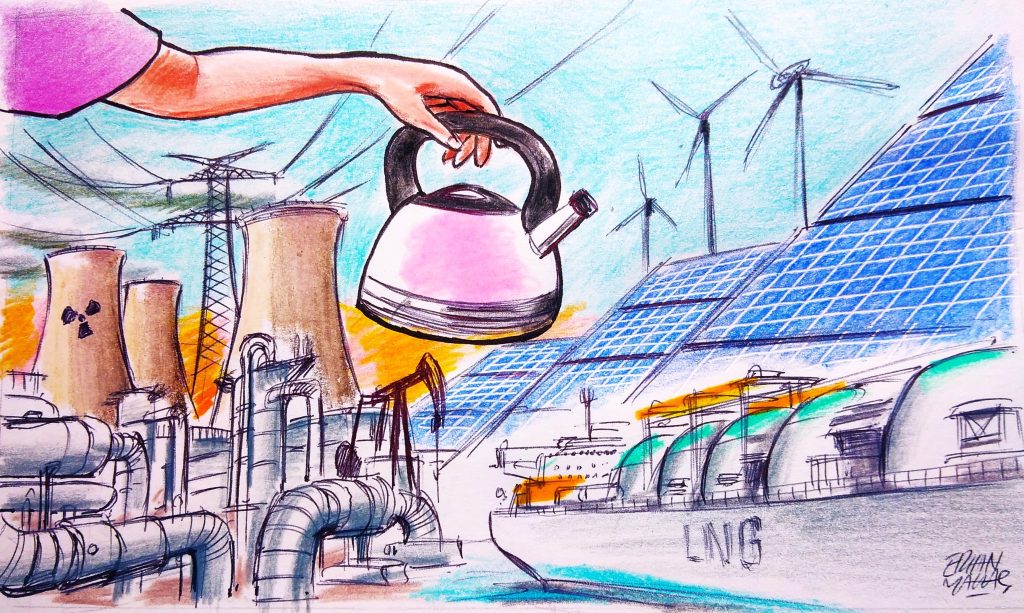“Russians invented chess, then moved on to playing it with pipelines.”
This humorous observation, made by the wit of Timothy Mitchell, the author of Carbon Democracy, appears to be a geopolitical pun but reveals an unexpected truth. Mitchell explains how energy functions as both a tool for governing and a means to influence political power in his book. Russia stands out as the foremost practitioner of this doctrine above all other nations.
Even with sanctions, embargoes and international isolation following its invasion of Ukraine, Russia has remained strong in its key asset, its resilient energy resources. Not only resilient but weaponized. Europe will continue its transition away from Russian gas by 2025, yet Russian President Vladimir Putin will remain engaged in his strategic foresight. We’ve entered the age of hybrid warfare where bullets fly alongside oil barrels.
By definition, hybrid war merges traditional military approaches with economic strain, cyberattacks and disinformation efforts together with energy blackmail. The energy sector represents an unvoiced conflict zone from Moldova through Slovakia to Finland. The sound of pipelines resembles distant gunshots while electricity grids show political unrest and gas storage levels have grown more vital than missile inventories.
One stark example is Slovakia. The pro-Russian position taken by Prime Minister Robert Fico left Slovakia trapped in the energy political battleground. Bratislava declared intentions to stop electricity deliveries to Ukraine after Ukraine tried to disrupt gas passage to Slovakia. Ukrainian President Volodymyr Zelenskyy claimed that Putin ordered Fico to initiate a new offensive against Ukraine. This isn’t diplomacy – it’s energy warfare.
Russia adapts, contrives
We need to revisit American author Daniel Yergin’s foundational research to comprehend how Russia wields energy influence. Yergin illustrates energy as both a strategic resource and a catalyst for conflict and power control in his book “The Prize: The Epic Quest for Oil, Money & Power.” Control of extensive Siberian natural gas resources and key export structures, including Nord Stream pipelines, has secured Russia’s strategic position in Europe despite being excluded from diplomatic discussions.
The year 2022 saw Europe making efforts to reduce its dependency on Russian gas following Russia’s invasion of Ukraine. LNG terminals expanded across Germany and other regions, while Norway and the U.S. emerged as new gas suppliers, and plans for renewable energy gained speed. But Russia adapted. Russia shifted its gas exports to China and India while constructing parallel trade infrastructures. It strengthened its partnerships with Iran and Gulf states, which transformed energy issues to encompass global implications beyond Europe.
Russia’s shift in energy strategy represented a deliberate and planned approach. The Kremlin’s Energy Strategy of Russia to 2035 explicitly addresses the use of energy exports as a geopolitical tool. In simple terms, our energy dependence means you’ll follow our guidance.
Europe struggles, fragments
And Europe? Europe responded with fragmented resilience. Some countries, like Poland and the Baltic states, made significant efforts to break away from Russian energy supplies, but Hungary and Slovakia stayed closely connected. In early 2025, Gazprom continued to supply gas to Central Europe by using covert routes, which involved intermediary trading mechanisms.
Europe’s poorest nation, Moldova, has endured political turmoil and widespread blackouts when energy supplies became strained. Facing cyberattacks on its power grid, which were believed to be from Russian-connected entities, Finland fortified its military and energy collaboration at the northern frontier.
The energy war focuses more than just on access because it heavily relies on perception. As Sarah O. Ladislaw and Meghan L. O’Sullivan point out in their book Energy’s Digital Future, “Energy is increasingly shaped by invisible forces: Russia cuts off gas supplies and points fingers at Ukraine for the disruption while using media campaigns to amplify public discontent and deepening divisions across Europe.”
Meanwhile, battered but not broken, Ukraine is fighting a dual war: on the battlefield and on the grid. Its energy infrastructure has been repeatedly targeted. The International Energy Agency reports that Ukraine suffered a 40% reduction in energy generation capacity from 2022 to 2024 because of repeated missile strikes. Through emergency EU support and decentralized solar and battery systems, Ukraine kept its energy supply running despite the attacks.
What lies ahead?
Russia’s energy war will evolve. The global shift toward sustainable energy solutions is driving Putin to adjust his strategies. Putin will enhance his influence by expanding nuclear energy exports and forming deals about critical minerals and energy technology with nations like Türkiye, China and Iran. The changing energy landscape extends beyond gas pipelines to include lithium resources and uranium sources together with hydrogen production and digital energy control systems.
Europe needs to stop viewing energy as a separate sector and acknowledge its role in national security. Green transitions represent dual-purpose initiatives serving as both environmental strategies and declarations of independence. Wind turbines operating in the North Sea have become as critical for strategic purposes now as military tanks were back in 1985.
Russia’s hybrid energy war reminds us of the principles of the Prussian general Carl von Clausewitz, that war represents politics through different methods; today’s “different methods” encompass thermostats alongside gas meters and blackout alerts.
In this cold war of kilowatts, one thing is clear: The future power struggle will focus on controlling ammunition and weapons while pivoting toward control over electrical infrastructure.


